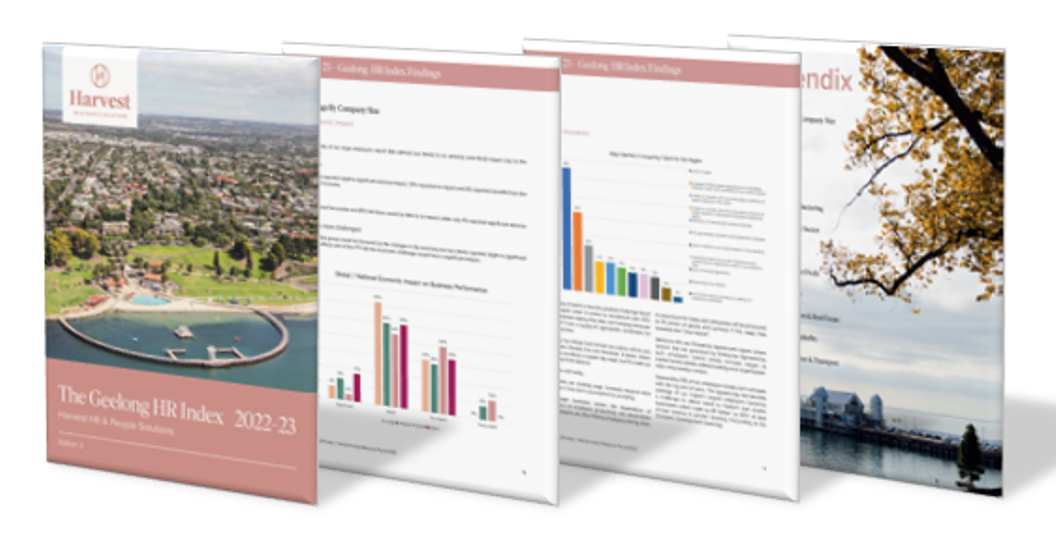The Geelong HR Index Survey Results and Recent Findings for our region’s Industrial organisations
Harvest is the curator of the Geelong HR Index. The catalyst of the HR Index is a change in the landscape or disruptors that impact organisations and workplaces. In 2019 Harvest’s HR Index looked at changes (over several years) to the Greater Geelong Region’s employment landscape. The 2020/2021 HR Index addressed emerging from Covid. Harvest’s recent survey addressed economic pressures and their impact on our region’s employers. Harvest is proud to announce its partnership with Geelong Manufacturing Council, having recently joined as a member and, with this, presents its findings for the industrial community.
Survey questions were honed to specific areas including:
- Economic impacts
- Employment Trends
- Capability and
- Talent Attraction, Acquisition and Retention
The findings by industry follow:
Agriculture and Food
Economic challenges proved favourable for this sector with more domestic supply anticipated. Because of the demand 70% of those surveyed anticipated increasing staffing levels with a significant uptake of blue-collar roles and some additions in office/administration, asset management, HR & sales disciplines. Over 60% of those surveyed were investing in leadership as the key area for training and development with half looking to optimise performance through on the job training/mentoring. This sector is challenged in acquiring talent due to lack of supply or salary offerings not matching candidates’ preferred remuneration packages. This sector loses talent due to competition locally for similar skillsets or employees seeking better conditions.
Energy and Resources
Employers across the sector felt our economy would have a slight to zero adverse impact on business performance. Because of this the sector did not envisage significant hiring activity and remained stable in its employment numbers. Companies who were adding team members were seeking them across strategy, change management, technical, technology, marketing and asset management. This sector focused more on formal training and accreditation or upskilling as the key capability uplift, while talent acquisition challenges stemmed from lack of supply or the gap between education and employment readiness. The sector reported three reasons they lose talent; discipline is often headhunted for their skills, cannibalism within the region or lack of career progression/succession opportunities.
Engineering and Manufacturing
Depending on the product or service, this sector reported diverse findings from favourable to slightly unfavourable business performance stemming from the economy. Two-thirds of respondents were looking to hire while one third would remain steady in terms of workforce. The largest discipline reported from the sector was blue collar workers followed by technical (engineering). Every organisation surveyed reported lack of supply as the key recruitment challenge while lack of progression opportunities was reported by most employers as the key reason employees leave.
Property, Construction and Real Estate
One third of the surveyed audience felt business performance would be favoured or that current economic challenges would have little to no impact on their business. As such, this sector is experiencing employment growth with technical (engineering and technical specialists) and project/program managers being the most sought after specialisation followed by trades and blue collar. This sector seeks to optimise performance through on the job training/mentoring or further licenses and certificates. While lack of supply was this sector’s major barrier to hiring staff, the sector is also experiencing significant wage growth. Employers that do not match the salary expectations of candidates have major barriers to acquiring talent. As this sector is mobile, a key reason employees leave is they are able to join another company (Melbourne/Regional/National or International) with increased benefits.
Wholesale, Warehouse & Transport
This sector has experienced growth and two-thirds of respondents felt the economy would have a favourable impact on business performance. Of all the industrial sectors, the wholesale, warehouse and transport sector reported the largest increase in casual workforce (62% hiring casuals) over permanent staff (38% hiring people on a permanent basis). Disciplines being employed were blue collar (warehouse/drivers) or tourism and hospitality with Avalon Airport and TT Lines’ Spirit of Tasmania falling under the Transport Sector. The vast majority (75% of employers) saw the lack of supply as the key barrier in acquiring staff. Subsequently, two-thirds reported their employees leave to join other companies with increased benefits while half reported a lack of career progression as a key talent retention challenge.
The Geelong HR Index is conducted by Harvest Talent Recruitment and People Solutions.
Further information on the survey and its findings can be channeled to Maree Herath, Harvest Director.

